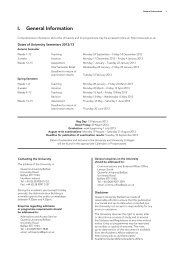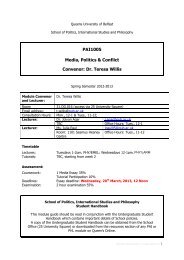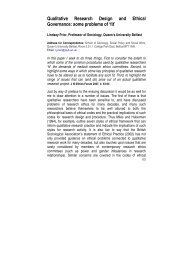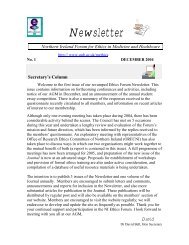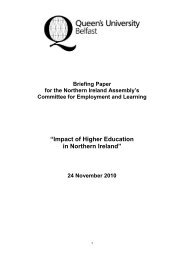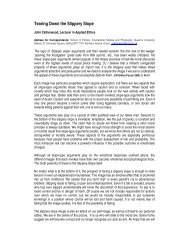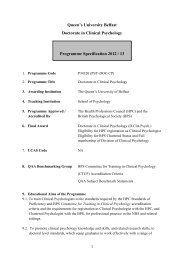Therapeutic Confidentiality and the Provision of Psychological ...
Therapeutic Confidentiality and the Provision of Psychological ...
Therapeutic Confidentiality and the Provision of Psychological ...
Create successful ePaper yourself
Turn your PDF publications into a flip-book with our unique Google optimized e-Paper software.
<strong>Therapeutic</strong> <strong>Confidentiality</strong> <strong>and</strong> <strong>the</strong> <strong>Provision</strong> <strong>of</strong><br />
<strong>Psychological</strong> Counselling for Children <strong>and</strong> Young<br />
People in <strong>the</strong> Nor<strong>the</strong>rn Irel<strong>and</strong> Healthcare Setting<br />
Dr Peter Jenkins, Lecturer in Counselling<br />
Address for Correspondence: Educational Support <strong>and</strong> Inclusion Research Group,<br />
Faculty <strong>of</strong> Education, Humanities Building, The University <strong>of</strong> Manchester, Oxford Road<br />
Manchester UK M13 9PL Email: education.enquiries@man.ac.uk<br />
Counselling children crucially depends on an underst<strong>and</strong>ing <strong>of</strong> <strong>the</strong>ir<br />
specific rights to confidentiality under <strong>the</strong> law. There are a number <strong>of</strong><br />
conflicting approaches to <strong>the</strong> issue <strong>of</strong> children's rights (Daniels <strong>and</strong><br />
Jenkins, 2000) 3 : (i) <strong>the</strong> 'welfare model': children's interests are decided<br />
by adults; (ii) <strong>the</strong> 'participatory model': children have a right to a say in<br />
decisions about <strong>the</strong>ir well-being; (iii) <strong>the</strong> 'independence model': children<br />
have rights to make <strong>the</strong>ir own decisions for <strong>the</strong>mselves. Perhaps<br />
confusingly, each <strong>of</strong> <strong>the</strong>se distinct approaches finds some measure <strong>of</strong><br />
support under <strong>the</strong> law. Pastoral care in schools <strong>of</strong>ten works on <strong>the</strong><br />
welfare model based on <strong>the</strong> concept <strong>of</strong> acting in loco parentis, with <strong>the</strong><br />
school as substitute parent. Alternatively, sections <strong>of</strong> <strong>the</strong> Children Act<br />
1989 confirm <strong>the</strong> rights <strong>of</strong> children to take part in decisions about <strong>the</strong>ir<br />
future, as for example, in discussing whe<strong>the</strong>r to return home from<br />
residential care. Finally, some aspects <strong>of</strong> <strong>the</strong> law, based on <strong>the</strong> decision<br />
<strong>of</strong> <strong>the</strong> House <strong>of</strong> Lords in <strong>the</strong> Gillick case, stress <strong>the</strong> rights <strong>of</strong> children to<br />
make certain decisions on <strong>the</strong>ir own. Thus, children under <strong>the</strong> age <strong>of</strong> 16<br />
may have enough underst<strong>and</strong>ing to seek medical treatment or<br />
contraceptive advice. The stance taken by counsellors will depend upon<br />
which model <strong>of</strong> children's rights <strong>the</strong>y support in practice. J NI Ethics Forum<br />
2005, 2: 38-47<br />
38
Welfare approach to counselling<br />
Under this approach, children or young people are seen largely in terms<br />
<strong>of</strong> <strong>the</strong> responsibilities held by adults for <strong>the</strong>ir care <strong>and</strong> protection. In<br />
school settings, counselling may sometimes only be provided with <strong>the</strong> full<br />
knowledge <strong>and</strong> agreement <strong>of</strong> parents. This may have <strong>the</strong> effect <strong>of</strong><br />
deterring many children from approaching <strong>the</strong> counsellor in <strong>the</strong> first<br />
place, or <strong>of</strong> making <strong>the</strong>m carefully edit what <strong>the</strong>y say as a result. Ano<strong>the</strong>r<br />
concern in school settings relates to counselling young people about<br />
sexuality issues. This is based on restrictions on local authorities<br />
'promoting' homosexuality under s.28 <strong>of</strong> <strong>the</strong> (recently repealed) Local<br />
Government Act 1988. In fact, teachers' <strong>and</strong> counsellors' worries on this<br />
issue may be unfounded. A subsequent little-publicised government<br />
circular had clearly stated that s.28 "will not prevent <strong>the</strong> objective<br />
discussion <strong>of</strong> homosexuality in <strong>the</strong> classroom, nor <strong>the</strong> counselling <strong>of</strong><br />
pupils concerned about <strong>the</strong>ir sexuality" (para. 20, DoE Circular 12/88).<br />
Participatory approach:<br />
Child care legislation since 1975 has developed <strong>the</strong> principle that<br />
children have a right to take part in discussions about decisions affecting<br />
<strong>the</strong>ir lives. This has been endorsed by s. 22 <strong>of</strong> <strong>the</strong> Children Act 1989. It is<br />
also expressed in Article 12 <strong>of</strong> <strong>the</strong> United Nations Convention <strong>of</strong> <strong>the</strong><br />
Rights <strong>of</strong> <strong>the</strong> Child 1989, ratified by <strong>the</strong> UK in 1991. The Convention<br />
recognises <strong>the</strong> need for "<strong>the</strong> views <strong>of</strong> <strong>the</strong> child being given due weight in<br />
accordance with <strong>the</strong> age <strong>and</strong> maturity <strong>of</strong> <strong>the</strong> child." This perspective<br />
gives counsellors greater opportunity to prioritise <strong>the</strong> <strong>the</strong>rapeutic<br />
relationship with <strong>the</strong> child, as distinct from subjecting it to <strong>the</strong> sometimes<br />
conflicting interests <strong>of</strong> parents, or o<strong>the</strong>r authorities such as schools.<br />
There may still be some instances when <strong>the</strong> counsellor may wish to<br />
override <strong>the</strong> child's wishes. This participatory approach to children's<br />
rights within counselling situations does not mean that <strong>the</strong> child's wishes<br />
39
will prevail. It simply requires that <strong>the</strong>y must be properly heard <strong>and</strong><br />
acknowledged.<br />
Independence model<br />
A great deal <strong>of</strong> confusion <strong>and</strong> misinformation surrounds <strong>the</strong> third possible<br />
approach to counselling children. In <strong>the</strong> key Gillick case, heard in<br />
Engl<strong>and</strong>, but carrying persuasive authority within Nor<strong>the</strong>rn Irel<strong>and</strong>, it was<br />
held that children under <strong>the</strong> age <strong>of</strong> 16 can be provided confidential<br />
medical treatment, without first requiring parental knowledge or consent,<br />
if <strong>the</strong> doctor decides that <strong>the</strong> child is <strong>of</strong> 'mature underst<strong>and</strong>ing'. According<br />
to Lord Scarman, "parental right yields to <strong>the</strong> child's right to make his<br />
own decisions when he reaches a sufficient underst<strong>and</strong>ing <strong>and</strong><br />
intelligence to be capable <strong>of</strong> making up his own mind on <strong>the</strong> matter<br />
requiring decision." (Gillick [1986]). Gillick actually concerns two key<br />
issues, <strong>the</strong> first <strong>of</strong> which is <strong>the</strong> right to consent to medical treatment<br />
independently <strong>of</strong> parental wishes. The second, however, concerns <strong>the</strong><br />
right to confidentiality, which is to be maintained whe<strong>the</strong>r or not treatment<br />
is provided, unless <strong>the</strong>re are overriding child protection concerns. Based<br />
on this perspective, many voluntary organisations, such as Brook<br />
Advisory <strong>and</strong> Childline, now provide confidential counselling to <strong>the</strong> child<br />
as <strong>the</strong> client, without first requiring parental consent.<br />
Case law following Gillick (e.g., Re R 4 A11ER 177 [1991], Re W 4A11<br />
ER CA 627 [1992]) may appear to have undermined <strong>the</strong> legal protection<br />
for counsellors working with <strong>the</strong> child as client. However, <strong>the</strong>se cases<br />
primarily relate to potentially extreme <strong>and</strong> even life-threatening<br />
circumstances. This has included <strong>the</strong> refusal by a young person to take<br />
anti-psychotic medication, or to consent to medical treatment for<br />
anorexia nervosa. Despite this, <strong>the</strong> key principles <strong>of</strong> Gillick remain intact<br />
for working with <strong>the</strong> vast majority <strong>of</strong> young people under <strong>the</strong> age <strong>of</strong> 16.<br />
The Gillick principle is central, for example, to <strong>the</strong> legal <strong>and</strong> ethical basis<br />
<strong>of</strong> providing voluntary psychiatric care for young people under <strong>the</strong> age <strong>of</strong><br />
40
16 (DoH/WO, 1999, para 31.6). 5 It is widely recognised <strong>and</strong> applied in<br />
<strong>the</strong> context <strong>of</strong> providing medical <strong>and</strong> psychological services for children<br />
in <strong>the</strong> healthcare sector 2, 11 .<br />
Children's rights or parental rights?<br />
Some agencies, such as Brook, base <strong>the</strong>ir practice firmly on <strong>the</strong>ir<br />
underst<strong>and</strong>ing <strong>of</strong> <strong>the</strong> Gillick principle. O<strong>the</strong>r agencies, particularly those<br />
working in schools, adopt a much more cautious approach, citing <strong>the</strong><br />
need to work in partnership with parents, as well as with children. One<br />
principle wheeled out to endorse this practice in a school setting is <strong>the</strong><br />
concept <strong>of</strong> being in loco parentis. This is an archaic piece <strong>of</strong> Victorian<br />
case law, dating from <strong>the</strong> last century, which requires school teachers to<br />
care for <strong>the</strong>ir pupils as would a 'careful fa<strong>the</strong>r', a principle adapted by<br />
degrees to 'careful parent' in subsequent case law. The concept carries a<br />
strong subliminal suggestion that, in acting for parents, schools should<br />
be mindful <strong>of</strong> parents' wishes <strong>and</strong> concerns. Offering a child-centred<br />
counselling service for young people without specifying a need for prior<br />
parental consent could be seen to run counter to this approach. In one<br />
version <strong>of</strong> <strong>the</strong> argument, parents have rights as well -including a right to<br />
family privacy <strong>and</strong> a right to be involved in decisions about <strong>the</strong>ir children.<br />
Providing confidential counselling to children without parental agreement<br />
would surely <strong>the</strong>n count as a major infringement <strong>of</strong> <strong>the</strong> rights <strong>of</strong> <strong>the</strong><br />
parents, to say <strong>the</strong> very least, according to this view.<br />
This argument is persuasive, but mistaken. Case law has shown that<br />
parents do not, in fact, have a strong case in claiming an infringement <strong>of</strong><br />
<strong>the</strong>ir parental rights by organisations such as Social Services. Under <strong>the</strong><br />
Children Act 1989, <strong>the</strong> concept <strong>of</strong> 'parental rights' has been decisively<br />
displaced by that <strong>of</strong> 'parental responsibility'. This is a set <strong>of</strong> powers <strong>and</strong><br />
duties which can be determined by <strong>the</strong> courts, <strong>and</strong>, for example, can be<br />
acquired in this way by a key figure in a child's life, such as a<br />
gr<strong>and</strong>parent. The emphasis carried by this concept is much more on <strong>the</strong><br />
41
duties <strong>and</strong> responsibilities involved in caring for children than on an<br />
untrammelled notion <strong>of</strong> parental power <strong>and</strong> authority over children.<br />
In many sectors <strong>of</strong> <strong>the</strong> law, <strong>the</strong> rights <strong>and</strong> needs <strong>of</strong> children are now<br />
considered quite separately from <strong>the</strong> wishes <strong>and</strong> choices <strong>of</strong> <strong>the</strong>ir parents.<br />
This is true in <strong>the</strong> case <strong>of</strong> child protection, family proceedings <strong>and</strong> in<br />
complex decisions regarding medical treatment. Gillick builds on <strong>the</strong>se<br />
developments within <strong>the</strong> law in recognising that young people have a<br />
right to confidentiality, <strong>and</strong> to consent to medical treatment,<br />
independently <strong>of</strong> parental wishes, if <strong>the</strong>y have sufficient underst<strong>and</strong>ing <strong>of</strong><br />
<strong>the</strong> issues concerned.<br />
Review <strong>of</strong> <strong>the</strong> Mental Health Act<br />
Yet, in <strong>the</strong> ongoing consultation over reforming <strong>the</strong> Mental Health Act<br />
1983, <strong>the</strong> clash <strong>of</strong> pr<strong>of</strong>essional perspectives on Gillick against wider<br />
political priorities is all too clear. This split is revealed in <strong>the</strong> stances <strong>of</strong><br />
successive Green <strong>and</strong> White Papers in addressing <strong>the</strong> continuing<br />
problem <strong>of</strong> psychiatric provision for young people. The challenging<br />
recommendations <strong>of</strong> <strong>the</strong> Expert Committee for <strong>the</strong> consultative Green<br />
Paper were actually to buttress <strong>the</strong> Gillick principle, ra<strong>the</strong>r than to sound<br />
fur<strong>the</strong>r retreat. The Expert Committee favoured a clear recognition <strong>of</strong> 16<br />
as <strong>the</strong> threshold for capacity for making treatment decisions, with, more<br />
controversially, a rebuttable presumption <strong>of</strong> children's capacity for<br />
consent from an age as low as 10 or 12 (DoH, 1999) 4 . The Mental<br />
Health Act Commission has also recommended that existing case law on<br />
Gillick be given clearer legal status via statute (MHAC, 1999) 9 . This<br />
would presumably be on <strong>the</strong> lines <strong>of</strong> Scottish legislation, such as <strong>the</strong> Age<br />
<strong>of</strong> Legal Capacity (Scotl<strong>and</strong>) Act 1991.<br />
These innovative proposals have, unfortunately, been ducked in <strong>the</strong><br />
Government's response in <strong>the</strong> White Paper. It seems that <strong>the</strong>ir intention<br />
is simply to hold <strong>the</strong> line on Gillick, confusing as it may be to many<br />
42
healthcare practitioners working with under 16's (DoH, 2000; Ford <strong>and</strong><br />
Kessel, 2001) 7 . Instead, <strong>the</strong> preferred policy focus will be on developing<br />
age-appropriate psychiatric accommodation for young people, especially<br />
for <strong>the</strong> seriously under-resourced 16-18 age group. This latter issue has<br />
been correctly highlighted by successive Mental Health Act Commission<br />
Reports as requiring urgent attention. The contradictions in wider<br />
Government policy, however, remain unresolved on <strong>the</strong> contentious<br />
issue <strong>of</strong> Gillick <strong>and</strong> young people's rights to confidential <strong>the</strong>rapy. The<br />
Government has a clearly stated public commitment to <strong>the</strong> 1989 UN<br />
Convention on <strong>the</strong> Rights <strong>of</strong> <strong>the</strong> Child, with <strong>the</strong> appointment <strong>of</strong> a Minister<br />
for Children in Engl<strong>and</strong>. However it seems that, in <strong>the</strong> present dash to<br />
construct an over-arching strategic reform <strong>of</strong> psychiatric care, a decisive<br />
opportunity for introducing some joined up policy on <strong>the</strong> Gillick principle<br />
is all too likely to be overlooked.<br />
Nor<strong>the</strong>rn Irel<strong>and</strong> Review <strong>of</strong> Mental Health <strong>Provision</strong> for Children <strong>and</strong><br />
Adolescents<br />
In <strong>the</strong> specific context <strong>of</strong> <strong>the</strong> current review <strong>of</strong> mental healthcare<br />
provision, <strong>the</strong>re are a number <strong>of</strong> suggested developments which could<br />
be considered, based on <strong>the</strong> model <strong>of</strong> children’s rights described above,<br />
in terms <strong>of</strong> <strong>the</strong>ir rights respectively to welfare, participation <strong>and</strong><br />
independence. These suggestions could be linked to <strong>the</strong> detailed <strong>and</strong><br />
comprehensive survey <strong>of</strong> current provision in Nor<strong>the</strong>rn Irel<strong>and</strong><br />
undertaken for <strong>the</strong> Children’s Law Centre (O’Rawe, 2003) 10 . The<br />
following fairly modest proposals are all drawn from recent reviews or<br />
reports on this issue in Engl<strong>and</strong> <strong>and</strong> Wales, <strong>and</strong> are set out as potential<br />
aims for <strong>the</strong> future service. (Specific sources are numbered, <strong>and</strong> appear<br />
as a separate section in <strong>the</strong> references at <strong>the</strong> end <strong>of</strong> <strong>the</strong> article.)<br />
Proposals for Nor<strong>the</strong>rn Irel<strong>and</strong> Review <strong>of</strong> Mental Health <strong>Provision</strong><br />
for Children <strong>and</strong> Adolescents<br />
Welfare:<br />
43
• to identify <strong>the</strong> mental healthcare needs <strong>of</strong> children <strong>and</strong> adolescents<br />
<strong>and</strong> plan appropriate provision (1)<br />
• to set st<strong>and</strong>ards <strong>and</strong> protocols for mentally ill minors detained in<br />
adult wards (1)<br />
• to establish agreed working <strong>and</strong> referral arrangements with CAMHS<br />
(1)<br />
Participation<br />
• to make patient information available in formats accessible to<br />
children (2)<br />
• to set a duty to provide advocacy services (2)<br />
Autonomy<br />
• to bring selected parts <strong>of</strong> case law into statute (3)<br />
- to assume a threshold <strong>of</strong> 16 for presumption <strong>of</strong> capacity (4)<br />
- to assume a rebuttable presumption <strong>of</strong> capacity for <strong>the</strong> 10 – 16<br />
age group (4)<br />
<strong>Confidentiality</strong><br />
These proposals for change need to be underpinned by a reappraisal <strong>of</strong><br />
<strong>the</strong> status <strong>of</strong> confidentiality in providing mental healthcare for children<br />
<strong>and</strong> young people, based on <strong>the</strong> Gillick principle, <strong>and</strong> <strong>the</strong> similar <strong>the</strong>mes<br />
contained within Scottish statute. <strong>Confidentiality</strong> for young people is<br />
recognised <strong>and</strong> protected by both common law <strong>and</strong> statute, notably via<br />
s.60 <strong>of</strong> <strong>the</strong> Data Protection Act 1998 <strong>and</strong> Article 8 <strong>of</strong> <strong>the</strong> Human Rights<br />
Act 1998. The right <strong>of</strong> <strong>the</strong> child to confidentiality is logically distinct from<br />
<strong>the</strong>ir capacity to consent to treatment if seen to be <strong>of</strong> ‘sufficient<br />
underst<strong>and</strong>ing’. This means that confidentiality needs to be maintained,<br />
44
unless <strong>the</strong>re are over-riding concerns about <strong>the</strong> welfare <strong>and</strong> safety <strong>of</strong> <strong>the</strong><br />
child concerned. Considering <strong>the</strong> needs <strong>of</strong> <strong>the</strong> child as <strong>the</strong> primary<br />
patient or client, independently <strong>of</strong> parental concerns or claims to<br />
involvement, will inevitably raise tensions <strong>and</strong> challenges to healthcare<br />
practitioners, particularly where services are provided on <strong>the</strong> basis <strong>of</strong><br />
partnership with families. Counsellors need to be continually alert to <strong>the</strong><br />
potential for conflict <strong>of</strong> interests between child <strong>and</strong> parents, which will<br />
require provision for a distinctly child-centred, ra<strong>the</strong>r than family-based,<br />
service. This tension will become increasingly difficult to operate, given<br />
<strong>the</strong> strong <strong>and</strong> mounting pressures for information sharing about children<br />
within multi-disciplinary teams such as Child <strong>and</strong> Adolescent Mental<br />
Health Service (CAMHS) teams.<br />
The proliferation <strong>of</strong> information sharing mechanisms currently at work, in<br />
terms <strong>of</strong> CAMHS, child protection teams, Connexions Services <strong>and</strong><br />
Youth Offending Teams, all point towards <strong>the</strong> difficulties <strong>of</strong> preserving <strong>the</strong><br />
client’s right to confidentiality, where <strong>the</strong> child or young person is <strong>the</strong><br />
focus <strong>of</strong> concern by a range <strong>of</strong> practitioners with a common pr<strong>of</strong>essional<br />
agenda. The right <strong>of</strong> <strong>the</strong> individual child to confidentiality needs vigilant<br />
protection, subject to <strong>the</strong> necessary limitations <strong>of</strong> a binding statutory duty<br />
on pr<strong>of</strong>essional to disclose information, <strong>the</strong> client’s own disclosure made<br />
via informed consent, <strong>and</strong> risk <strong>of</strong> significant harm to self or o<strong>the</strong>rs.<br />
Research carried out for <strong>the</strong> current review <strong>of</strong> <strong>the</strong> Mental Health Act<br />
illustrates, even if only anecdotally, that parents <strong>and</strong> children have<br />
contrary <strong>and</strong> conflicting expectations <strong>of</strong> what a ‘confidential’ counselling<br />
service actually means. For parents, it refers to a transparent <strong>and</strong><br />
accessible service 8 . For children as consumers, it means protection <strong>of</strong><br />
sensitive confidential information from access by o<strong>the</strong>r parties, including<br />
parents if necessary 1 . These conflicting expectations are not easily<br />
reconciled. The law concerning counselling children <strong>and</strong> young people is<br />
clearly complex. Yet it <strong>of</strong>fers increased possibilities for working with <strong>the</strong><br />
child as <strong>the</strong> client, based on <strong>the</strong> Gillick principle. This approach dem<strong>and</strong>s<br />
45
<strong>of</strong> counsellors both a sound underst<strong>and</strong>ing <strong>of</strong> <strong>the</strong> law, <strong>and</strong> a willingness<br />
to balance a degree <strong>of</strong> risk against <strong>the</strong>ir own pr<strong>of</strong>essional accountability.<br />
Dr Jenkins was one <strong>of</strong> <strong>the</strong> speakers at <strong>the</strong> NI Ethics Forum Annual Conference 2003 on<br />
<strong>the</strong> topic <strong>of</strong> Mental Health Ethics. He is a co-author, with Vincent Keter <strong>and</strong> Julie Stone,<br />
<strong>of</strong> Psycho<strong>the</strong>rapy <strong>and</strong> <strong>the</strong> Law: Questions <strong>and</strong> Answers for Counsellors <strong>and</strong> Therapists.<br />
(Whurr, 2004)<br />
(Author’s note: This article is based on law applying in Engl<strong>and</strong>, Wales<br />
<strong>and</strong> Scotl<strong>and</strong>, but <strong>the</strong> broad principles described here will also relate to<br />
<strong>the</strong> law in Nor<strong>the</strong>rn Irel<strong>and</strong>.)<br />
References<br />
1. Baruch, G., James, C. Report from Consultation with Users <strong>of</strong> Child<br />
<strong>and</strong> Adolescent Mental Health Services. London: DoH, 2003.<br />
2. British Medical Association. Consent, Rights <strong>and</strong> Choices in Health<br />
Care for Children <strong>and</strong> Young People. London: BMA, 2001.<br />
3. Daniels, D., Jenkins, P. Therapy with Children: Children’s Rights,<br />
<strong>Confidentiality</strong> <strong>and</strong> <strong>the</strong> Law. London: Sage, 2000.<br />
4. Department <strong>of</strong> Health. Reform <strong>of</strong> <strong>the</strong> Mental Health Act 1983:<br />
Proposals for Consultation. Cm 4480. London: Stationery Office,<br />
1999.<br />
5. Department <strong>of</strong> Health/Welsh Office. Mental Health Act 1983: Code <strong>of</strong><br />
Practice. London: Stationery Office, 1999.<br />
6. Department <strong>of</strong> Health. Reforming <strong>the</strong> Mental Health Act Part 1: The<br />
New Legal Framework. Cm 5016. London: Stationery Office, 2000.<br />
7. Ford, I., Kessel, A. Feeling <strong>the</strong> way: childhood mental illness <strong>and</strong><br />
consent to admission <strong>and</strong> treatment. British Journal <strong>of</strong> Psychiatry,<br />
179: 384-6, 2001.<br />
8. Lovering, K. User Views <strong>of</strong> Child <strong>and</strong> Adolescent Mental Health<br />
Services. Exeter: University <strong>of</strong> Exeter <strong>and</strong> Cornwall Social Services<br />
Department, 2003.<br />
9. Mental Health Act Commission. Mental Health Act Commission: 8 th<br />
46
Biennial Report. London: Stationery Office, 1999.<br />
10. O’Rawe, A. Children <strong>and</strong> Adolescent Mental Health Services in<br />
Nor<strong>the</strong>rn Irel<strong>and</strong>. Belfast: Children’s Law Centre, 2003.<br />
11. Spender, Q., Salt, N., Dawkins, J., Kendrick, I., Hill, P. Child Mental<br />
Health in Primary Care. Abingdon: Radcliffe Medical Press, 2001.<br />
Sources for proposals<br />
(1). Mental Health Act Commission. Mental Health Act Commission: 9 th<br />
Biennial Report. London: Stationery Office, recommendations 64,<br />
65, 66, 2001<br />
(2). Mental Health Act Commission. Mental Health Act Commission<br />
Response to <strong>the</strong> Draft Mental Health Bill Consultation. Nottingham:<br />
MHAC, para 2.9, 2002.<br />
(3). Mental Health Act Commission. Mental Health Act Commission: 8 th<br />
Biennial Report. London: Stationery Office, para 10.80, 1999.<br />
(4). Department <strong>of</strong> Health. Report <strong>of</strong> <strong>the</strong> Expert Committee: Review <strong>of</strong><br />
<strong>the</strong> Mental Health Act 1983. London: Stationery Office, paras 13.2,<br />
13.3., 1999.<br />
47



